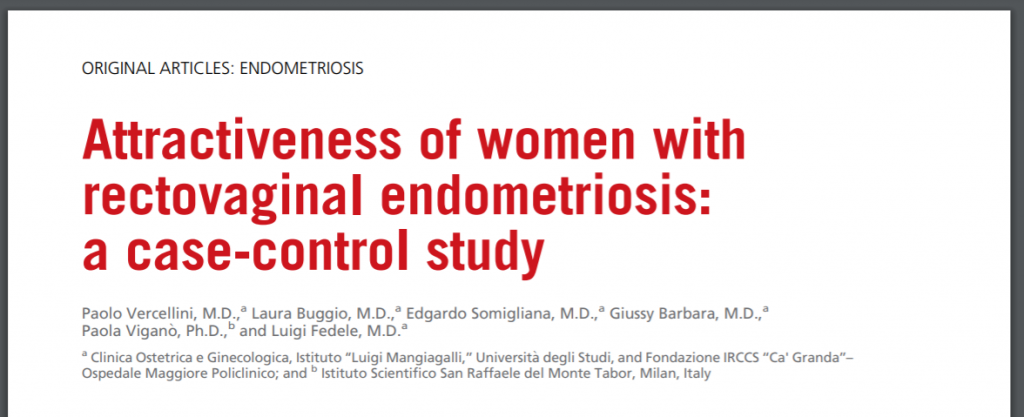
Despite media reports announcing the retraction of a much-criticized study of whether women with endometriosis were more attractive than other women, the study has yet to be retracted by the journal.
Last week, several news outlets, picking up on a story in The Guardian, said the study, first published in 2012 in Fertility and Sterility, had been retracted.
The study, called “Attractiveness of women with rectovaginal endometriosis: a case-control study,” claimed to show that:
Women with rectovaginal endometriosis were judged to be more attractive than those in the two control groups. Moreover, they had a leaner silhouette, larger breasts, and an earlier coitarche.
As we noted on Friday, however, while the authors of the study have requested its retraction, the study remains intact in the journal, an Elsevier title.
We asked Elsevier about the status of the paper on Wednesday. Today, Andrew Davis, head of communications at the publisher, confirmed:
No, this has not been retracted, this is an advance notice that the authors have requested it to be retracted.
Like Retraction Watch? You can make a tax-deductible contribution to support our work, follow us on Twitter, like us on Facebook, add us to your RSS reader, or subscribe to our daily digest. If you find a retraction that’s not in our database, you can let us know here. For comments or feedback, email us at [email protected].
Nor should it be retracted. And the editors should stand strong on this.
You can’t retract an article that you claim was conducted according to correct methodology and conducted in good faith just because you don’t like how it’s being interpreted in the popular press. You’re trying to have your cake and eat it too.
You regret having conducted the study and having published it. Duly noted. But that’s not grounds for a retraction.
The article should remain, with a link to the authors’ statement.
Not clear that the opinions of four anonymous people on “attractiveness” can be considered a basis for correct scientific methodology.
The definition of attractiveness is not objective, and the opinions of four people on a purely subjective criterion is not a scientific study.
The only conclusion you can make from the study is: some people may find women with recto-vaginal endometriosis more attractive (but there is no evaluation of statistical significance so maybe not).
So yeah, the paper is bad, the methodology is poor, the conclusions are not supported by the data presented, it needs retraction.
No, it doesn’t need to be retracted. The study shows what it shows, its up to other researchers to make their own interpretations. The methodology is there, the conclusions are supported by the data and it doesn’t need a retraction.
Why now? Why 8 years after the fact?
Sorry, but no. (By the way, hi, Warren. I’m staying pseudonymous, but we actually used to know each other a little bit in real life.)
The correct way to handle an allegedly poorly conducted study is not a retraction, but a better conducted study. If it comes to the opposite conclusion.
Small sample size is not adequate grounds for retraction, and if you’re concerned about the subjective nature of “attractiveness” (etc.) in a scientific study, then you’re going to have to retract entire fields of study in the humanities and social sciences.
Just because a study is stupid and pointless doesn’t mean it should be retracted. Do you remember the good old days when a bad study could just be ignored?
Actually the informed consent was not obtained. Women were not aware of the purpose of the study and this was clearly stated in the manuscript. I wonder how it was possible to have it published at all…
It was about time for a retraction.
The paper states women were not informed that evaluators would rate their attractiveness, nor that “degree of physical attractiveness” was the primary outcome for the study. This is alone is deceptive and problematic regarding fully informed consent. If the women were not informed after the fact, and given an option to withdraw consent, their consent was never fully informed and the study is in violation of the Declaration of Helsinki and the journal’s own ethics policy.
The authors’ rationale for this deception seems problematic too:
“However, in order to limit potential unintentional seductive behaviors that might have swayed the raters’ judgment, information on the specific hypothesis of different degrees of attractiveness in the three study groups was not given in advance of the physical evaluation.”
That’s right, the authors didn’t tell the women their attractiveness was being rated by four evaluators, using an unvalidated five-point rating scale, due to concerns about “potential unintentional seductive behaviors”. No mention of potential for harm to the women themselves (e.g. experiencing shame, humiliation, disgust, distress at having four separate people evaluate their attractiveness, in addition to disclosing substantial information on their sexual health and history), or potential to harm the women’s relationship with doctors at the clinic (e.g. concerns that doctors would rate their attractiveness and base treatment decisions on this subjective measure), or even potential for reputational damage to the health centre (described by the authors as “a tertiary-level referral center for the treatment of endometriosis from a nationwide catchment area “).